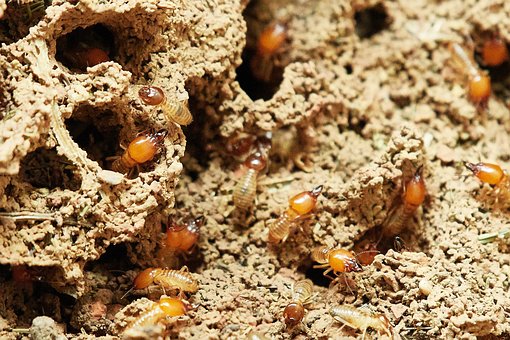Termite Treatment Options West Pennant Hills NSW – Emergency Residential Exterminators
The longer you wait, the worse your pest infestation can get. If you suspect you have a pest problem in West Pennant Hills, don't delay. Call us now!
The longer you wait, the worse your pest infestation can get. If you suspect you have a pest problem in West Pennant Hills, don't delay. Call us now!
 A termite evaluation is the first step in termite management
A termite evaluation is the first step in termite management
Termites and the termite swarm have belonged to our natural world for millions of years. Also commonly called white ants they are resilient and consistent, being found, on average, in every 3rd property.
Australian conditions are particularly appropriate for termites. The Australian standard suggests that a termite evaluation be performed every 12 months and more often in high risk locations.
Contact us to book your yearly Termite Assessment.
Termite baiting does not include spraying chemicals or trenching. Stations are positioned in specific locations around your house and once termite activity is discovered, baits are positioned inside the existing stations. The termite bait used is non-chemical that contains an active component, so effective that only a percentage is required. Termites consume the bait and bring it to back the colony where they share it with other termites.
 Termite dusting is the very first stage of a termite treatment as it entails utilizing active termites. Sydney’s Castle Hill Pest Controluse Termidor Dust which is non-repellent and is 95.5% food alpha cellulose, the exact same material used as the food source in most of the termite bait systems.
Termite dusting is the very first stage of a termite treatment as it entails utilizing active termites. Sydney’s Castle Hill Pest Controluse Termidor Dust which is non-repellent and is 95.5% food alpha cellulose, the exact same material used as the food source in most of the termite bait systems.
To Apply Termidor Dust: Small holes are made in infested wood or straight onto termite trails. Using a little puffer, fine dust is puffed directly onto termites within the infested wood, these holes are covered to seal the workings, to prevent any dust leaving and to decrease disruption of the termites.
The termites will continue togo about their typical activities long enough to transfer the Termidor Dust to unsuspecting termites within the colony. It will generally take 3-6 weeks for the colony to be impacted by the dust.
Termite dusting nevertheless does not offer an on-going protection to a building from future termite attacks. There might be more than one termite nest within striking distance and termites are constantly developing brand-new nests.
This is why a termite soil treatment is crucial following termite dusting.
Termite Soil Treatment: Termite soil treatments are the favored choice for removing termite problems. Nevertheless, soil treatment does depend upon the construction style of your house and can be discussed with the technician on the day of the termite evaluation.
Termite soil barrier treatments are applied to soil locations in which the structure is in contact with including:
If the range between the soil and flooring woods is greater than 400-mm the soiled locations within the subfloor are trenched and treated. In any case we typically prefer to treat the entire of the subfloor. This increases surface area coverage in the subfloor and for that reason increases the possibility of termites coming into contact with Termidor.
Concrete boundaries are drilled at around 20 to 30-cm centres (1.2-cm holes), injected and re-concreted, as if nothing took place.
These locations could include:.
Repellent: Repellent termiticides work by developing a termite hazardous barrier around a home. The treated locations end up being a no-go zone for termites. In order to work properly, these termiticides need to be applied in an unbroken zone around the structures. This can be tough to achieve due to the construction and design of your house and if there is concrete against your home. Repellent termiticides are mainly used throughout the pre-construction stage.
Non-repellent: With non-repellent termiticide, termites are not able to detect that an area has been treated and hence do not avoid the treated location. When the termites travel through the termiticide, they make contact with the active component, return to the colony and infest the unsuspecting termites, which will result in their extermination.
Castle Hill Pest Control offers a 5-year warranty on non-repellent treatment. Conditions do apply and are subject to the house structure and design.

The tracking and baiting is a complete system that involves
Termite baiting systems work extremely well, and once a nest is removed or controlled, the termite tracking stations will continue to protect your house against new termite activity. The approximated time of colony removal is 3– 6 months.
In most cases your house is the most costly item you may own; do not let it be gnawed by termites!
Searching for termite control services in West Pennant Hills and North Rocks, Beecroft, Carlingford, Pennant Hills, Cherrybrook, Cheltenham, Castle Hill, Baulkham Hills, Epping, North Epping? Call us today!
We take great pride in ourselves as one of many handful of companies that feature an affordable pricing policy. Regardless of your spending budget, rest assured that we will work something out for you! Our professional exterminators are happily expecting your call. Connect with us today!
Other services we provide include Termite Treatment, Cockroach Removal, Ant and Spider Removal, Rat and Mouse Removal, Bed Bug and Flea Removal, and many more.
Other locations we cover include: Castle Hill, Hornsby, Parramatta